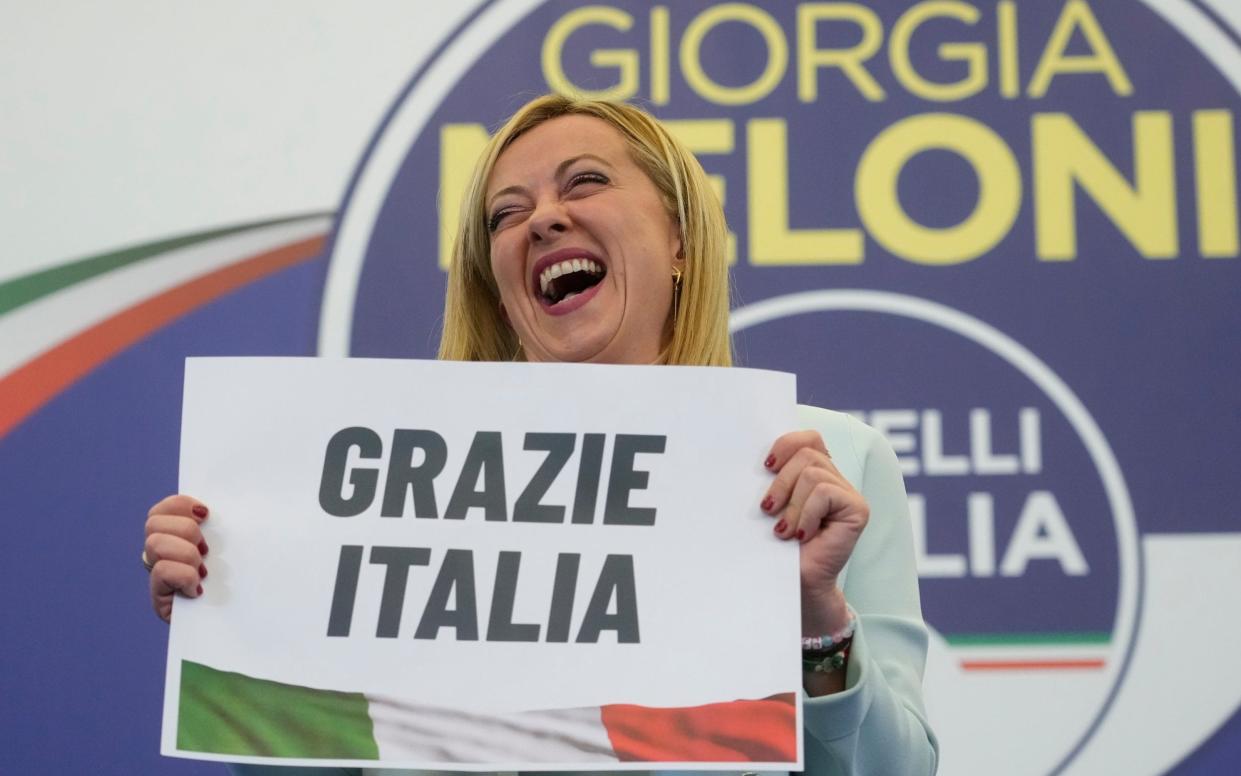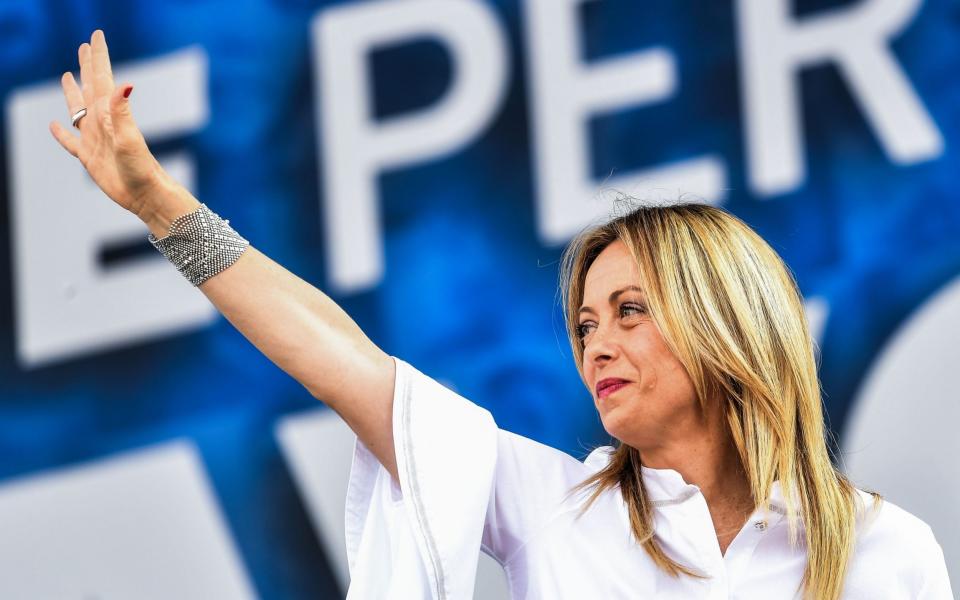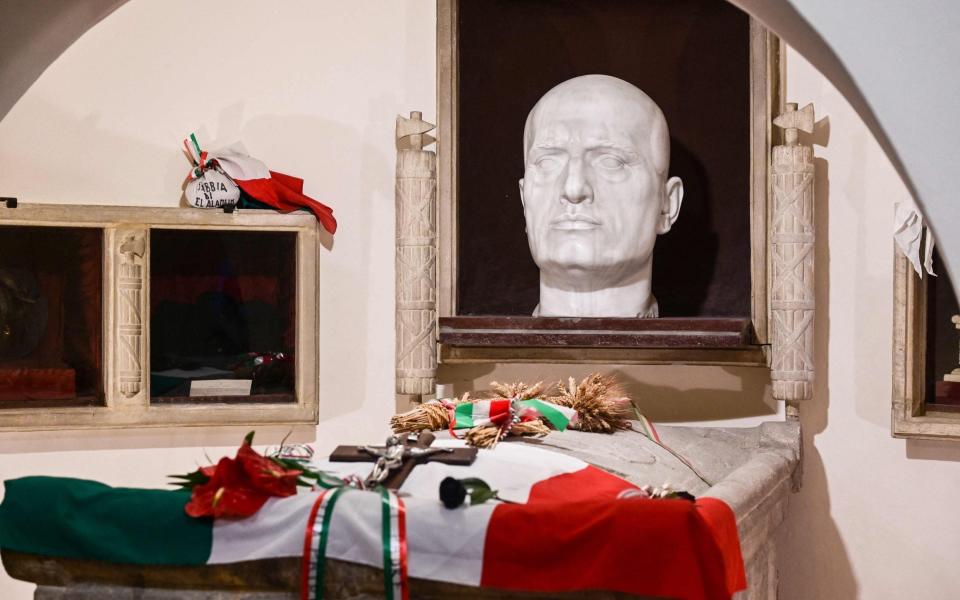Giorgia Meloni: heiress to Italy's fascists to become the country's first female leader

- Oops!Something went wrong.Please try again later.
- Oops!Something went wrong.Please try again later.
Abandoned by her father and bullied by other children for being chubby, life was not too rosy for Giorgia Meloni when she was growing up in a scruffy working-class district of Rome.
Thirty years on, she is having the last laugh.
The leader of the hard-Right Brothers of Italy party is about to become Italy’s first ever female prime minister, which would have been unthinkable just a few years ago.
Brothers of Italy, which is the modern-day heir to Italy’s fascist movement, was then a fringe party commanding less than four per cent of the national vote.
But in the general election on Sunday, Brothers of Italy won around 26 per cent of the vote, making it the country's biggest party. It will govern in alliance with Silvio Berlusconi's Forza Italia, a centre-right party, and the hard-right League, led by Matteo Salvini.
Together they clinched around 44 per cent of the vote, ensuring majorities in both chambers of parliament.

The 44-year-old mother of one has come a long way from her childhood in Garbatella, a working-class district in Rome that was built in the 1920s.
Her father’s abandonment of her, her sister and her mother – he sailed away from Italy on a yacht called “Cavallo Pazzo” or Crazy Horse and wound up in Gomera, one of the Canary Islands - was deeply traumatic.
Plied with biscuits and cakes by her adoring grandmother, Ms Meloni put on so much weight that by the age of nine she weighed 65kg. She was called “cicciona” – “fatty” – by the other kids.
At the age of 15 she joined the Movimento Sociale Italiano, the post-war successor to Benito Mussolini’s Fascist movement.

She signed up at her nearest branch, in Via Guendalina Borghese, in the heart of Garbatella.
“That’s the place where it all started”, she writes in her best-selling autobiography, I Am Giorgia.
At the age of 31, Ms Meloni became the youngest minister in Italian history, serving in a government led by Silvio Berlusconi.
She founded Brothers of Italy in 2012. Its initial performance was pitiful, attracting just 3.5 per cent of the vote in European elections in 2014 and just over 4 per cent in a 2018 general election.
But policies including a naval blockade of the North African coast to stop migrants from reaching Italian shores and incentives for couples to have more children have seen its popularity surge.
Although no longer advocating that Italy ditch the euro and return to the lire, Ms Meloni opposes any further political union with the EU, which she says has “tragically failed”. An admirer of Viktor Orban, she has backed Hungary in its battles with the EU over the rule of law and civil rights.

At the age of 19, while campaigning for a far-right party called the National Alliance, she insisted that "Mussolini was a good politician, in that everything he did, he did for Italy".
More recently she has sought to distance herself from her party's fascist roots and her admiration for "Il Duce" but she has refused to renounce it entirely.
During the election campaign she offered a half-hearted condemnation of fascism when asked if she thought it was “an absolute evil.” The phrase was used 20 years ago by a prominent hard-right politician, Gianfranco Fini, who was leader of the conservative National Alliance party.
Disavowing his past admiration for Mussolini, he made the remark at the Yad Vashem Holocaust Memorial in Jerusalem in 2003.
Asked whether she agreed, Ms Meloni appeared to dance around the question. “I was in National Alliance and I don’t think I said anything different (to him). It seems to me my response was clear. I did not dissociate myself from him.”
Many of the Italians who voted for her say fascism belongs to the distant past and holds no appeal for them. Many were instead motivated by disillusion with Italy's other parties and a willingness to give Ms Meloni a go - hers was the only party not to join the previous government, a broad coalition led by former central banker Mario Draghi.
But there is a certain historical symmetry to her electoral victory - it comes 100 years after the March on Rome, the putsch that brought Mussolini and his Blackshirts to power.

